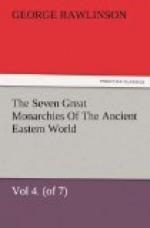[Here follows a similar account of works at Borsippa.] “In Babylon—the city which is the delight of my eyes, and which I have glorified—when the waters were in flood, they inundated the foundations of the great palace called Taprati-nisi, or ‘the Wonder of Mankind;’ (a palace) with many chambers and lofty towers; the high-place of Royalty; (situated) in the land of Babylon, and in the middle of Babylon; stretching from the Ingur-Bel to the bed of the Shebil, the eastern canal, (and) from the bank of the Sippara river, to the water of the Yapur-Shapu; which Nabopolassar my father built with brick and raised up; when the reservoir of Babylon was full, the gates of this palace were flooded. I raised the mound of brick on which it was built, and made smooth its platform. I cut off the floods of the water, and the foundations (of the palace) I protected against the water with bricks and mortar: and I finished it completely. Long beams I set up to support it: with pillars and beams plated with copper and strengthened with iron I built up its gates. Silver and gold, and precious stones whose names were almost unknown [here follow several unknown names of objects, treasures of the palace], I stored up inside, and placed there the treasure-house of my kingdom. Four years (?), the seat of my kingdom in the city..., which....did not rejoice (my) heart. In all my dominions I did not build a high-place of power; the precious treasures of my kingdom I did not lay up. In Babylon, buildings for myself and the honor of my kingdom I did not lay out. In the worship of Merodach my lord, the joy of my heart (?), in Babylon, the city of his sovereignty and the seat of my empire, I did not sing his praises (?), and I did not furnish his altars (i.e. with victims), nor did I clear out the canals.” [Here follow further negative clauses.]




